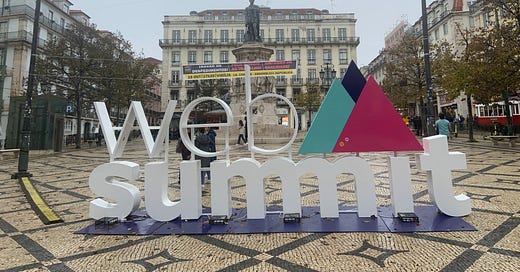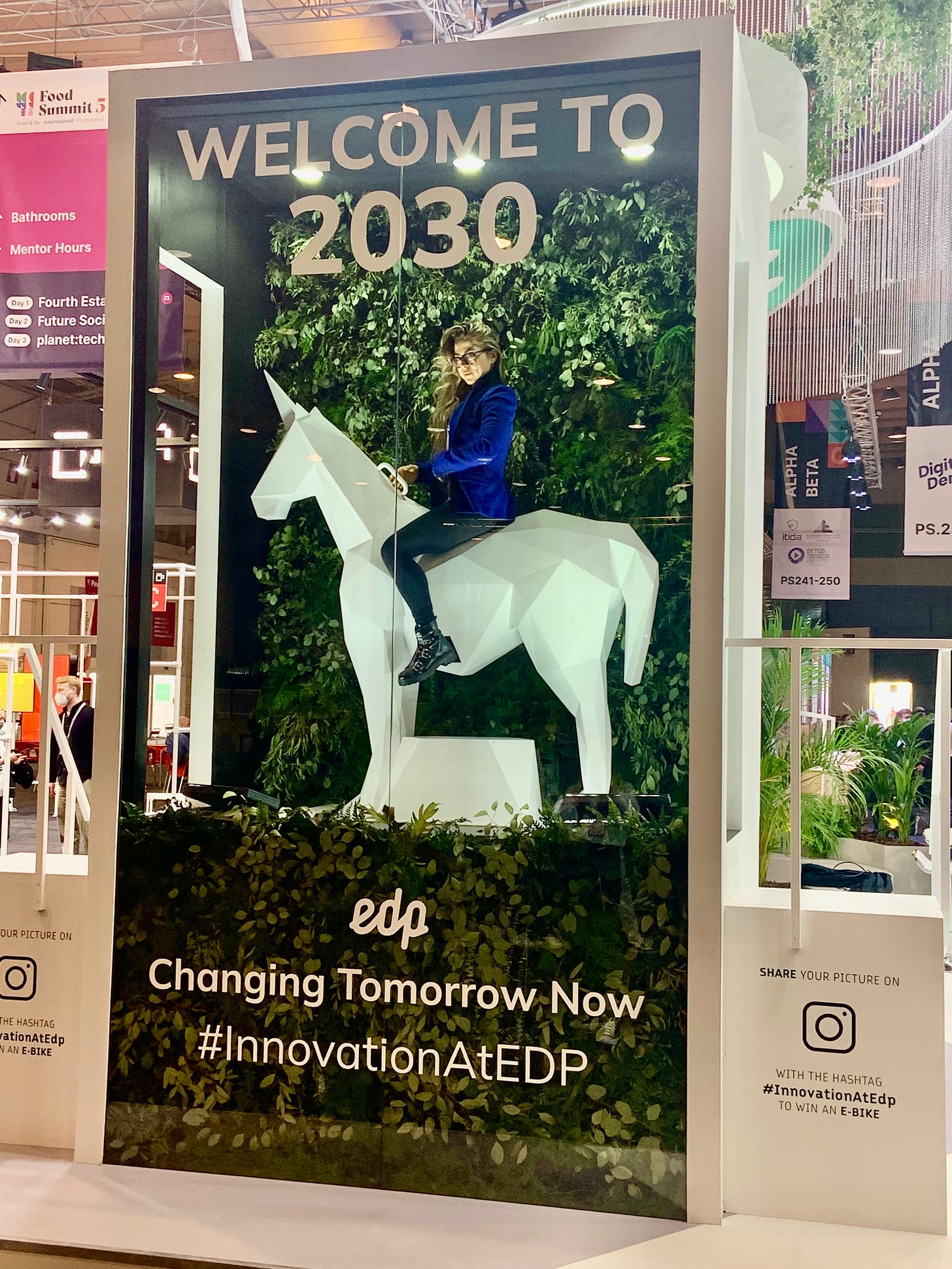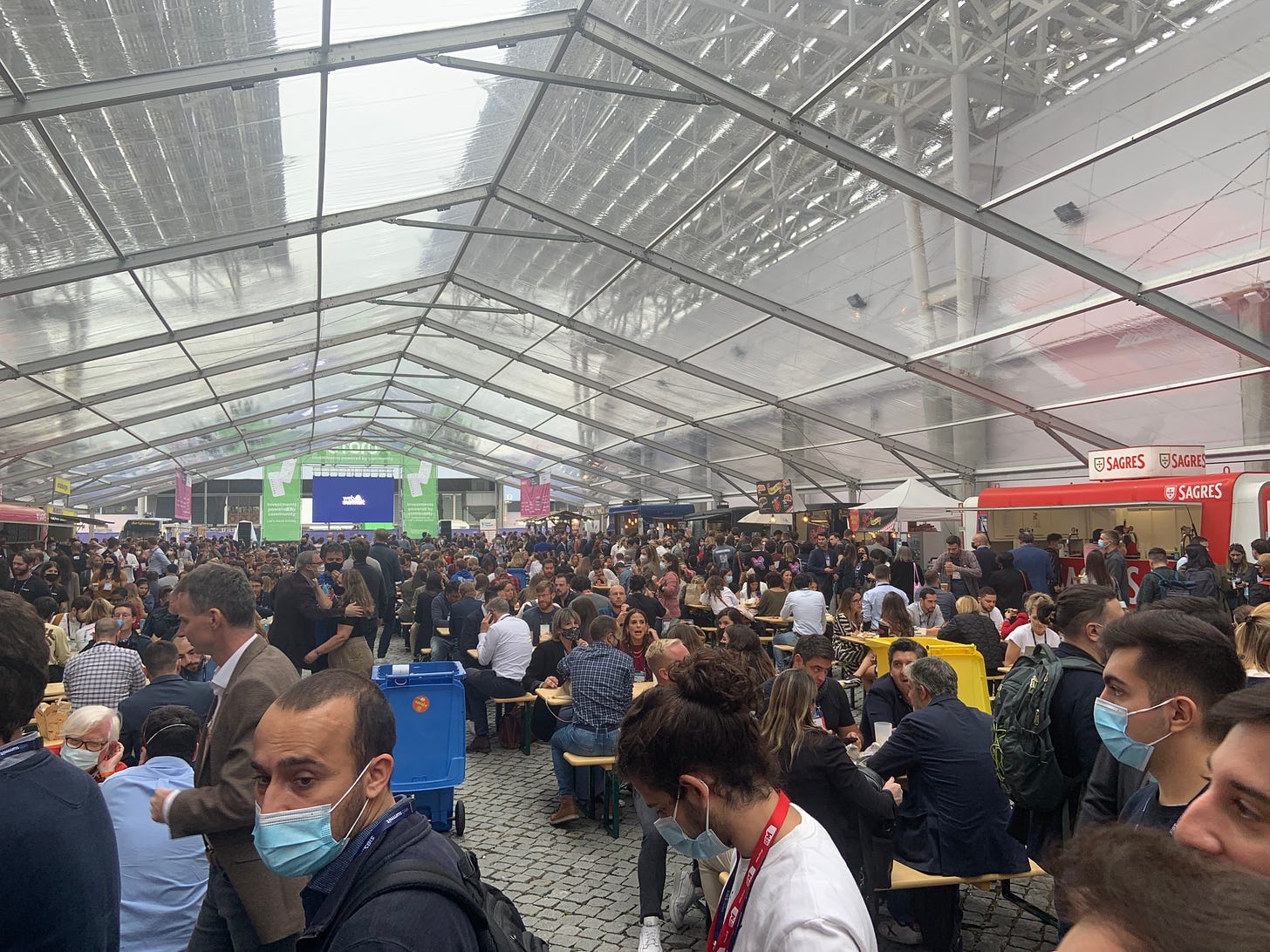Having travelled all over the world, some countries stand out. One such country is Portugal: nice climate, calm and friendly people (not the excesses you get in some other European countries), affordable (where else can you get great 1 Euro coffees and 2 Euro beers?) and as of this week the one nation that has hardly any people left to vaccinate: with a 98% rate they’re pretty much done. What’s more, most people wear their mask because they think it makes sense.
So it was not so surprising that the first global in person tech event took place in the Portuguese capital, Lisbon, with some 42,000 people attending. It was on all levels a huge effort, but the organization founded by Paddy Cosgrave and with great input from our Canadian friends Sunil Sharma and Casey Lau, pulled it off in a spectacular way. Really, I have never seen such a massive venue, fully populated and extremely well secured (no chance of getting in without a badge, a bracelet, vaccination papers, being frisked and then being checked again) where all exhibitors went out of their way to put on a real show. Prizes go to Qatar and Germany for country lounges and AWS for what I think was the most visited booth/presentation area. The honourable mention is for the Pitchbook sponsored exclusive investor lounge, the one area you were ‘safe’ from being pitched apart from the very nice but so persistent Pitchbook sales rep. You could spent a lifetime wandering the conference floors and talking to all, including the many start-ups that were pitching and who were helpfully grouped in alpha, beta and growth type opportunities. And food and drink, well, what can I say, this is Portugal and every taste was pretty much catered for.
The Canadian group of attendees (mostly entrepreneurs and some investors) was - given the absence of any government organizations - actively promoting the ‘Big North’ and used the comfy Collision lounge as the preferred area to hang-out. Many international founders and investors dropped by there, keen to learn more about setting up in Canada, which continues to be seen as both a cool and hot market for tech. But beyond that the notion of what to do and where to go in Canada is minimal, so it was great to help and put people in the right direction. We all concluded that Canada is great at promoting Canada to Canadians, but it needs to learn a thing or two to sell itself to international audiences.
Web Summit in particular is good at highlighting the political and social aspects of tech. On opening night Black Lives Matter co-founder Ayo Tometi addressed the crowd as did Frances Haugen, the Facebook whistleblower (although some see her more as a Democrat activist). But there was also space for discussion, rebuttals and questioning, former British politician and now Facebook VP Nick Clegg countered Haugen for instance and BLM founder Tometi’s thoughts were put under the microscope in an interview with Nicholas Thompson from the Atlantic. The Facebook debate however set the tone at Web Summit. In almost every talk or panel the subject somehow came up, to the point of letting Mark Zuckerberg become the convenient target for everyone now that we no longer have Trump around as a unifying force of evil. In one panel a British regulator, Melanie Dawes, was actually pushed to say what she thought about Zuckerberg as a person, repeatedly by an interviewer from Sky News. Dawes stayed calm and on point, but the Facebook-bashing did feel a little distasteful at times. What it does show however is how the political and the tech are now intertwined in an ongoing debate where each pushes the other in a certain direction.
On a conference where you could actually scale a physical unicorn during a week where Bitcoin and Tesla reached record highs, the question of inequality became a poignant one. Veteran Labour politician Peter Mandelson was also on stage to point out that the unparalleled growth has caused us to forget about keeping a level playing field for all. Left and right wing populists are now playing into this and it is clear tech has a role here, although no one presented any solutions, yet. All tech is doing now is creating a class of well-to-do globetrotting people and joining their ranks will - given the speed at which this group moves - be quite hard. The good thing is that Web Summit encourages this debate and is trying to find ways where we can improve life for all while we innovate like crazy at the same time.
On that note the Deep Tech stage was a real beauty were on the last day Carlos Garcia-Galan from NASA laid out why we are going back to the moon again. Not because the moon needs a revisit, no, we are merely testing how we can extend our stay in space and how we can work out longer distances over time: the moon is now a staging ground to get to Mars. At the same time Garcia-Galan pointed out that the efforts also served to get the younger generations interested in space again and his well attended talk underlined that that message is resonating.
Web Summit is back in Lisbon next year in early November and I really recommend everyone go there, it refreshes the mind and the opportunities to do deals and make new connections are endless. It was nice to be out of the Covid-mandated bubble and I learned lots on a wide range of topics. But before another haul to Lisbon, the same can be experienced in Toronto where Collision is back on June 20-23, 2022. Not sure if the coffee and beer will be as cheap as in Lisbon, but if the choices of the organization are anything to go by, it will be as exciting and intellectually challenging as anything. Not to be missed.





